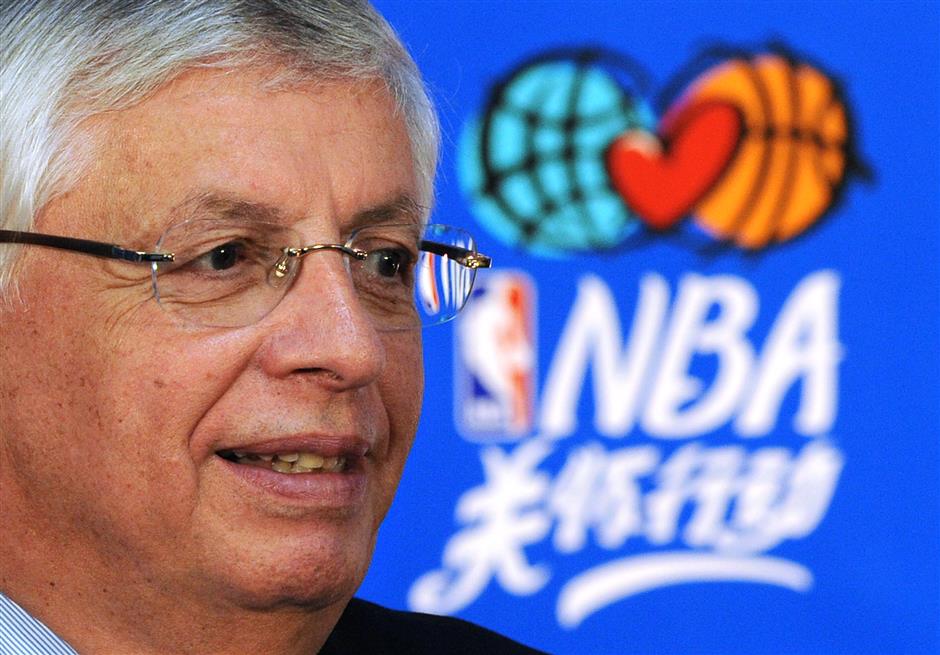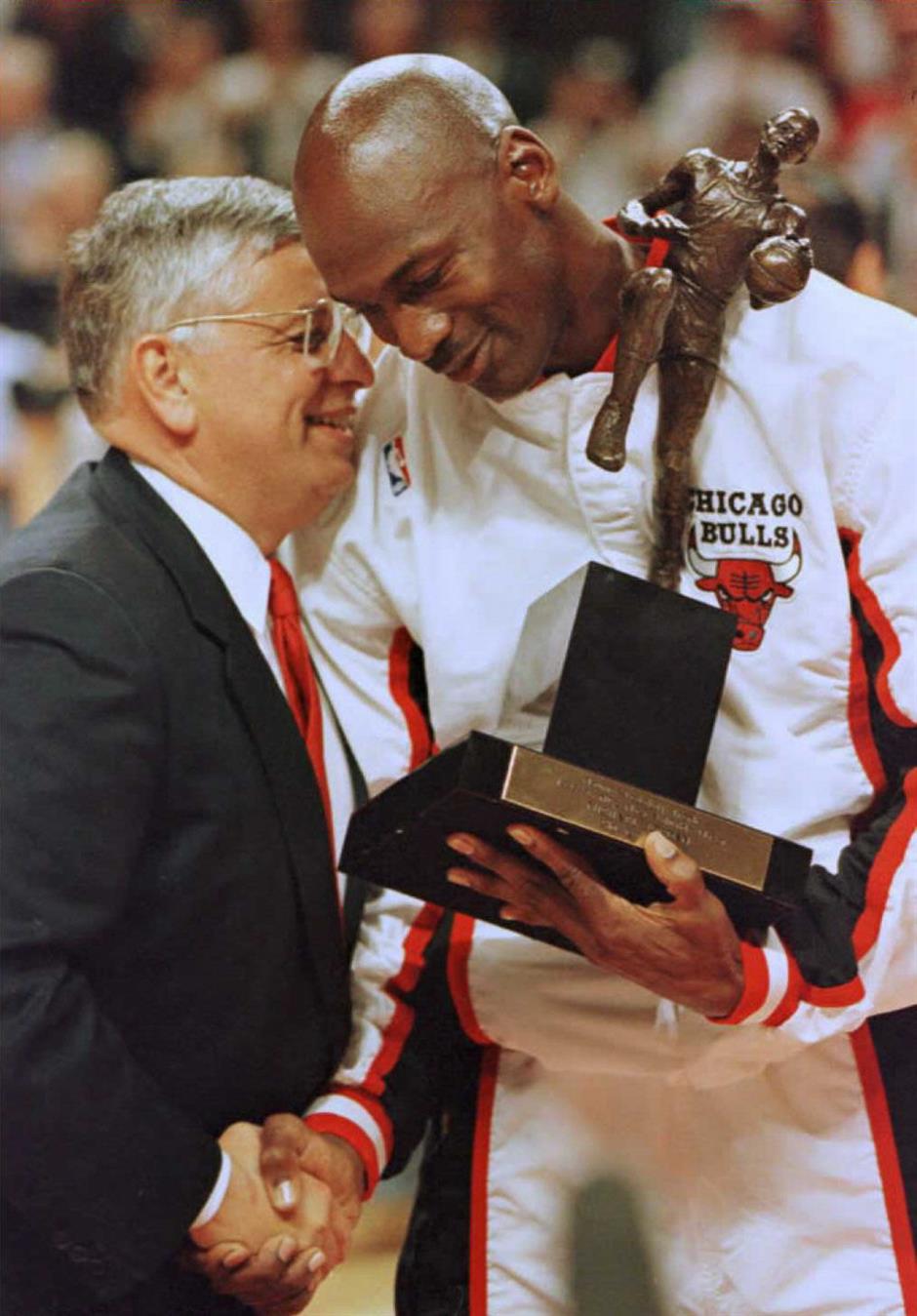
Then National Basketball Association commissioner David Stern listens to questions during a press conference held before an NBA preseason exhibition game between the Denver Nuggets and the Indiana Pacers at the Wukesong Arena in Beijing in this October 11, 2009, photo. Stern died on Wednesday after suffering a brain hemorrhage last month. He was 77. (File photo: AP)
David Stern had basketball as a passion and law as a profession, one he figured he could return to if a job at the National Basketball Association didn’t work out.
He never did.
Instead he went to Europe, Asia and plenty of other places around the world, bringing with him a league that was previously an afterthought in the United States and turning it into a global powerhouse.
Stern, who spent 30 years as the NBA’s longest-serving commissioner and one of the best in sports history, died on Wednesday. He was 77.
“Without David Stern, the NBA would not be what it is today,” Hall of Famer Michael Jordan said. “He guided the league through turbulent times and grew the league into an international phenomenon, creating opportunities that few could have imagined before.”
Stern suffered a brain hemorrhage on December 12 and underwent emergency surgery. The league said he died with his wife, Dianne, and their family at his bedside.
“The entire basketball community is heartbroken,” the National Basketball Players Association said. “David Stern earned and deserved inclusion in our land of giants.”
Stern had been involved with the NBA for nearly two decades before he became its fourth commissioner on February 1, 1984. By the time he left his position in 2014 — he wouldn't say or let league staffers say “retire,” because he never stopped working — a league that fought for a foothold before him had grown to a more than US$5 billion a year industry and made NBA basketball perhaps the world's most popular sport after soccer.
“Because of David, the NBA is a truly global brand — making him not only one of the greatest sports commissioners of all time, but also one of the most influential business leaders of his generation,” said Adam Silver, who followed Stern as commissioner. “Every member of the NBA family is the beneficiary of David’s vision, generosity and inspiration.”
Lakers forward LeBron James echoed Silver.
“We lost a great visionary,” James said. “Him and Dr. James Naismith are the two most important people for the game of basketball. Dr. Naismith because he invented the game and David for his vision, his vision to make this game global.”
Thriving on good debate in the boardroom and good games in the arena, Stern would say one of his greatest achievements was guiding a league of mostly black players that was plagued by drug problems in the 1970s to popularity with mainstream America.
He had a hand in nearly every initiative to do that, from the drug testing program, to the implementation of the salary cap, to the creation of a dress code.
But for Stern, it was always about “the game,” and his morning often included reading about the previous night's results in the newspaper — even after technological advances he embraced made reading NBA.com easier than ever.
“The game is what brought us here. It's always about the game and everything else we do is about making the stage or the presentation of the game even stronger, and the game itself is in the best shape that it's ever been in,” he said on the eve of the 2009-10 season, calling it “a new golden age for the NBA.”
One that was largely created by Stern during a three-decade run that turned countless ballplayers into celebrities who were known around the globe by one name: Magic, Michael, Kobe, LeBron, just to name a few.
Stern oversaw the birth of seven new franchises and the creation of the WNBA and NBA Development League, now the G League, providing countless opportunities to pursue careers playing basketball in the US that previously weren’t available.
Not bad for a guy who once thought his job might be a temporary one.

Then NBA commisioner David Stern congratulates Chicago Bulls guard Michael Jordan during the 1996 NBA Most Valuable Player trophy presentation in this May 21, 1996, photo. (File photo: AP)
Stern had been the league’s outside counsel from 1966 to 1978 and spent two years as the NBA’s general counsel, figuring he could always go back to his legal career if he found things weren’t working out after a couple of years.
Instead, after serving as the NBA's executive vice president of business and legal affairs from 1980-84, he replaced Larry O'Brien as commissioner.
Overlooked and ignored only a few years earlier, when it couldn't even get its championship round on live network TV, the NBA saw its popularity quickly surge thanks to the rebirth of the Lakers-Celtics rivalry behind Magic Johnson and Larry Bird, followed by the entry of Jordan just a few months after Stern became commissioner.
“There are no words that can really describe the far-reaching impact of commissioner Stern’s brilliance, vision, fairness and hard work over so many years,” Bird said. “When you think of all that he accomplished worldwide on behalf of thousands of players, so many fans, all of the jobs he created for team and arena employees and all of the people that benefitted from the many layers of growth in the sport and industry that David spearheaded and then passed on to others, there is no doubt commissioner Stern lifted the NBA to new heights and he will be greatly missed by all of us.”
Under Stern, the NBA would play nearly 150 international games and be televised in more than 200 countries and territories, and in more than 40 languages, and the NBA Finals and All-Star weekend would grow into international spectacles. The 2010 All-Star game drew more than 108,000 fans to Dallas Cowboys Stadium, a record to watch a basketball game.
“It was David Stern being a marketing genius who turned the league around. That's why our brand is so strong,” said Johnson, who announced he was retiring because of HIV in 1991 but returned the following year at the All-Star Game with Stern's backing.
“It was David Stern who took this league worldwide.”
David Joel Stern was born September 22, 1942, in New York, where he grew up a Knicks fan and worked in his father’s deli. A graduate of Rutgers University and Columbia Law School, he was dedicated to public service, launching the NBA Cares program in 2005 that donated more than US$100 million to charity in five years.
He would begin looking internationally soon after becoming commissioner and the globalization of the game got an enormous boost in 1992, when Jordan, Johnson and Bird played on the US Olympic Dream Team that would bring the sport a new burst of popularity while storming to the gold medal in Barcelona.
Stern capitalized on that by sending NBA teams to play preseason games against other NBA or international clubs, and opened offices in other countries. The league staged regular-season games in Japan in 1991 and devoted significant resources to China, and Stern's work there would pay off in 2008 when basketball was perhaps the most popular sport in the Beijing Olympics.
Stern stayed busy after leaving the league office, taking trips overseas on the NBA's behalf, doing public speaking and consulting various companies. He was inducted to the Naismith Memorial Basketball Hall of Fame in 2014.
Stern and his wife had two sons, Andrew and Eric.


